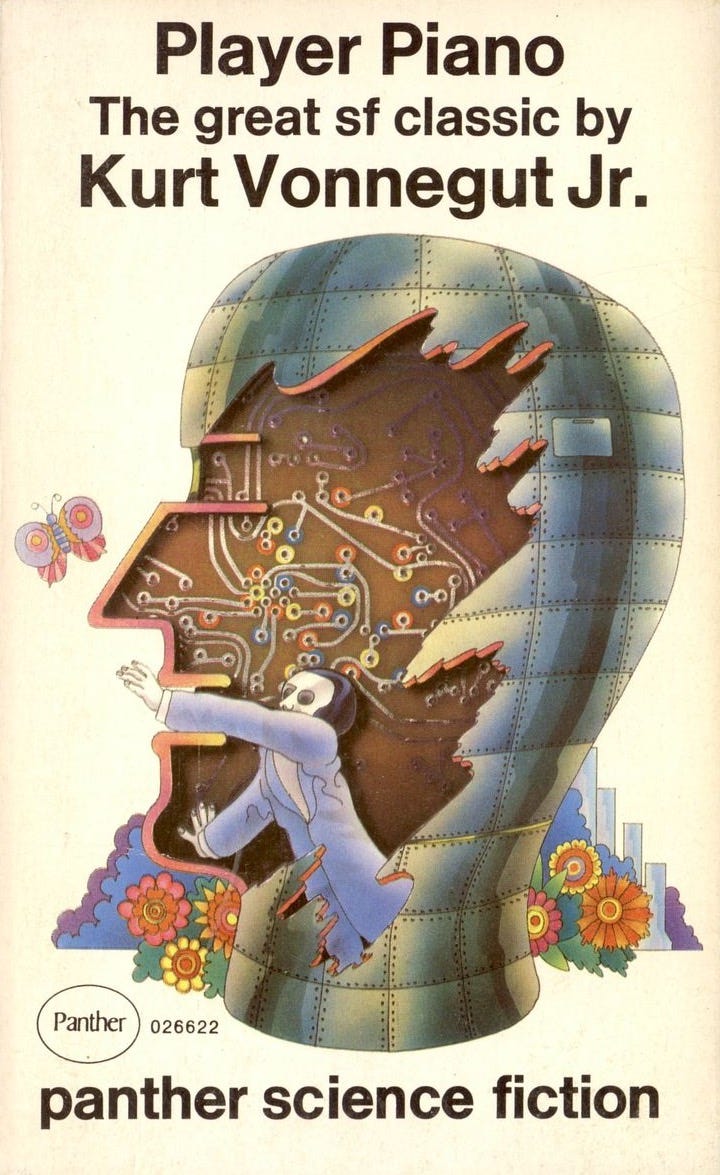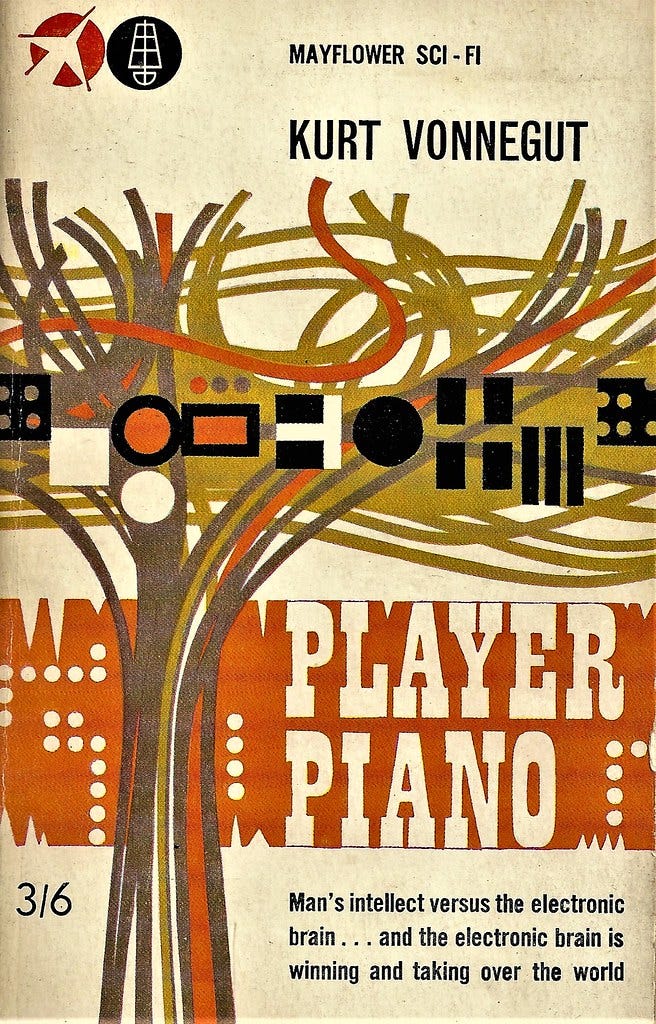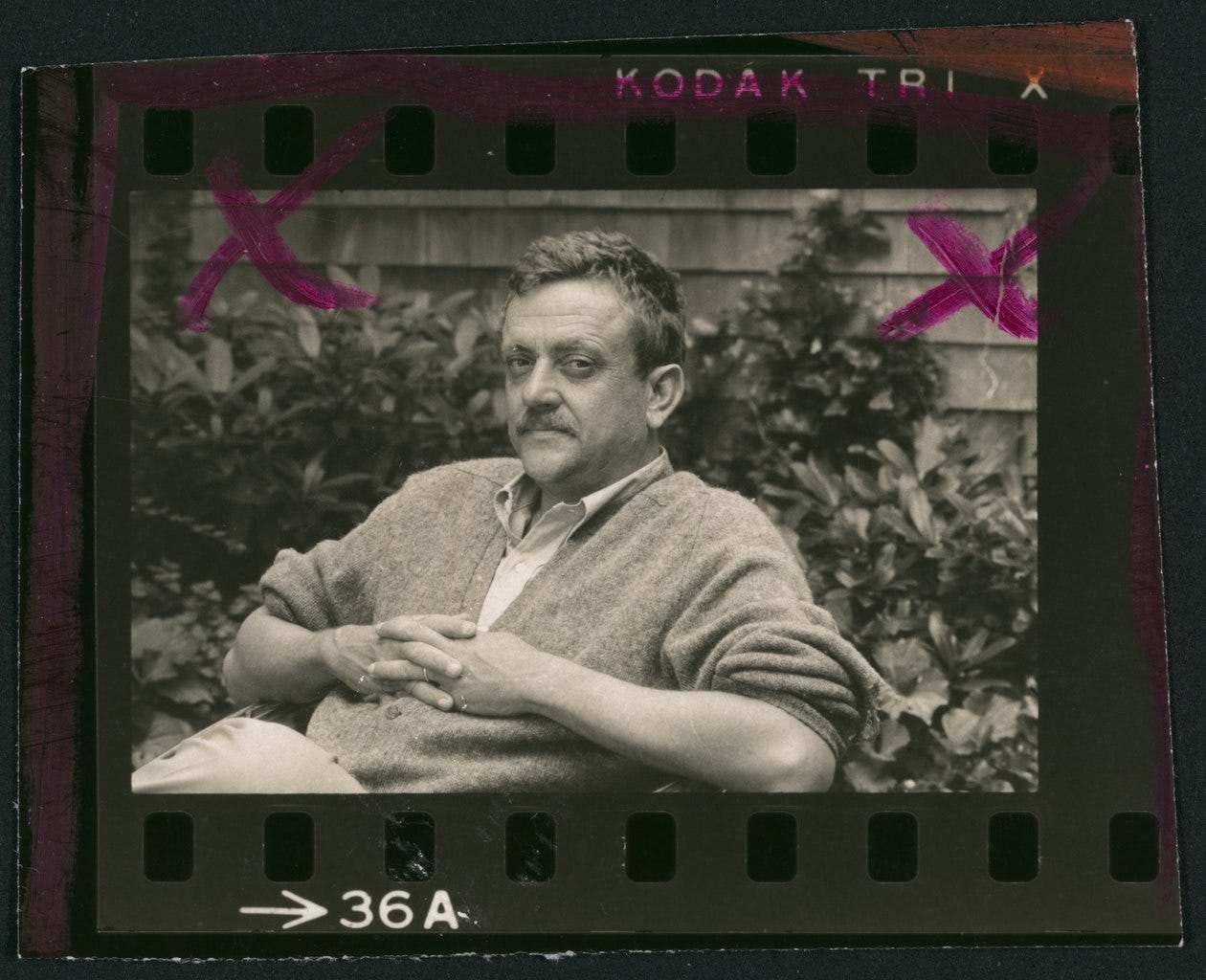Kurt Vonnegut’s Ambivalent War on AI
Reviewing His Prescient Debut Novel ‘Player Piano’
When Paul Proteus, director of the Ilium Works, brings a stray cat into his state-of-the-art factory to hunt mice, the feline startles, flees, and is accidentally electrocuted—zap!—an early sign in Kurt Vonnegut’s Player Piano that the organic and innocent fare poorly in a mechanized world.
‘A Little Clicking Box’
Player Piano presents a radically centralized and automated vision of postwar America. An enormous mainframe computer determines outputs, while machines handle all industrial labor. Outside the engineers and managers of these automated processes, most humans are either unemployed, serve in the military, or are relegated to make-work jobs on reconstitution and reclamation crews—the “Reeks and Wrecks.”
Vonnegut hit upon the idea for the novel after working in public relations for General Electric. “I saw a milling machine for cutting the rotors on jet engines, gas turbines,” he told Playboy in 1973. “This was a very expensive thing for a machinist to do. . . . So they had a computer-operated milling machine built to cut the blades, and I was fascinated by that.”
But it didn’t stop with milling machines. “This was in 1949,” he explained, “and the guys who were working on it were foreseeing all sorts of machines being run by little boxes and punched cards. . . .” Vonnegut’s job involved interviewing GE scientists and engineers about their inventions and innovations. The future was clear to them—automation would increasingly replace physical labor—but it troubled Vonnegut.
“The idea of doing that, you know, made sense, perfect sense,” he said. “To have a little clicking box make all the decisions wasn’t a vicious thing to do. But it was too bad for the human beings who got their dignity from their jobs.”
Thanks to Moore’s Law, those little boxes and punched cards gave way to ever-more sophisticated computers. Today, they can automate far more than physical labor; thanks to artificial intelligence, they’re increasingly automating intellectual labor as well. Though Vonnegut published Player Piano in 1952, it speaks to the anxieties sparked by today’s advances in AI: job loss, economic disruption, and the uneasy place of humans in a world increasingly run by machines.
Man and Computer
In Vonnegut’s short story “EPICAC,” published a couple years before Player Piano, a computer technician falls for a fellow operator. She plays along, but she won’t marry him; he’s not romantic enough. Desperate, he explains the situation to the computer, EPICAC, who—like today’s large language models—composes a poem to help. The man signs it and gives it to his beloved. It works! The woman is moved.
The man continues the deception with more poems, and eventually she agrees to marry him. But when he tells EPICAC what happened, the computer—realizing it can never win the woman’s affection for itself—commits suicide by intentionally melting down. In Player Piano, the computer fares just fine; it’s the society that plays with suicide.
Vonnegut resurrected EPICAC for Player Piano, now imagined as a massive system, EPICAC XIV—“intelligence bought by the foot and pound and kilowatt”—housed in the Carlsbad Caverns and making economic and personnel decisions for the entire nation. In one scene he describes the machine
at work deciding how many refrigerators, how many lamps, how many turbine-generators, how many hub caps, how many dinner plates, how many door knobs, how many rubber heels, how many television sets, how many pinochle decks—how many everything America and her customers could have and how much they would cost.
What’s more,
it was EPICAC XIV who would decide for the coming years how many engineers and managers and research men and civil servants, and of what skills, would be needed in order to deliver the goods; and what I.Q. and aptitude levels would separate the useful men from the useless ones, and how many Reconstruction and Reclamation Corps men and how many soldiers could be supported at what pay level and where, and . . .
EPICAC runs everything. But there’s still plenty of room in Vonnegut’s world for human drama, beginning with protagonist Paul Proteus’s ambivalence about his future as a manager, and extending through all those dispossessed Reeks and Wrecks men, who live across the river from the machines, their resentment quietly fermenting.
‘Those Who Live by Electronics’
Paul is up for a major promotion: director of the Pittsburgh Works. Does he want it? He doesn’t know. Paul’s wife, Anita, is far less ambivalent; she desperately wants the promotion.
Midcentury gender norms prevail in Player Piano. Women don’t publicly act and strive but gain status and influence through their husbands. Anita rises as Paul does; hence, Paul must rise, and Anita prods and pushes him to follow the plan—the script—that will secure Pittsburgh.
In a sense everything in their lives is scripted, including their marriage. “I love you” echoes throughout the novel, but the refrain—a more ironic and performative version of “so it goes” from Slaughterhouse-Five—is as mechanical and empty as the machines themselves. Paul maintains some feeling, but Anita speaks it like a calibration ping, a signal to keep Paul on track.
That’s a lost cause the moment Ed Finnerty, an old friend of Paul’s, shows up. Once part of the corporate machine, Finnerty has become a disillusioned outsider, and his return tosses everything into disarray—such as when he bets on Paul in a match against Checker Charley, an early AI machine that plays checkers.
Finnerty had examined Charley and noticed a loose connection. As Charley plays, it begins making mistakes. “It isn’t working right,” his handler complains. But Finnerty won’t let him stop, and Paul easily wins while Charley finally catches fire.
When the company’s senior boss protests that Finnerty should have alerted everyone about the loose connection, Finnerty throws down. “If Checker Charley was out to make chumps out of men, he could damn well fix his own connections,” he says. “Paul looks after his own circuits; let Charley do the same. Those who live by electronics, die by electronics.” Finnerty’s point? The people may need their machines, but the machines also need their people.
Because of this and other shenanigans, upper management believes Finnerty has turned coat and is now a saboteur—not just any saboteur but one involved with the secretive Ghost Shirt Society. In this highly mechanized world, saboteurs represent the worst form of antisocial threat, and the Ghost Shirts are the worst of the worst. The company desperately needs to infiltrate the society’s ranks and bring it down.
Their secret weapon? Poor Paul.
Drafted into the Rebellion
Since Paul’s close to Finnerty and hot for the Pittsburgh promotion—or so the company believes—management dangles the job as a reward for ratting on his friend. Paul won’t do it, but he can’t outright refuse until he has a Plan B worked out.
Paul’s escape plan takes the shape of an old farm, which he buys for a song because the original owner dictated in his will that it could never be modernized: Who wants to raise vegetables in a rundown house with no amenities? Paul sees this refuge as way to cash out of the system and go his own way.
The only hitch? Ah, Anita. Will she come with him? Paul naively believes she might embrace this life too, but there’s no hope of that. After an elaborate pitch in which he plays on every romantic, nostalgic angle he can muster, Anita blows him off. That’s not the program! She wants Pittsburgh; she wants it more than she wants Paul.
At the same time, upper management concocts a plan to insert Paul into the Ghost Shirt Society and bring it down. Publicly they fire Paul for sabotage, but secretly they free him to work his relationship with Finnerty to infiltrate the ranks. When he protests and quits, they’re thrilled: They think he’s playing along. Brilliant!
Instead, Paul joins the resistance. In fact, through a series of comic maneuvers that would become the hallmark of Vonnegut’s approach, he becomes its nominal leader. The company’s useful idiot is also the useful idiot of the company’s mortal enemy.
The Ghost Shirt Society publishes a manifesto and signs Paul’s name without his consent. “Without regard for the wishes of men,” the statement reads in part, “any machines or techniques or forms of organization that can economically replace men do replace men.” They don’t deny such replacement could be good but insist that those affected must have a say in the decision. How that would happen isn’t clear, but Ghost Shirt Society demands are:
I propose that men and women be returned to work as controllers of machines, and that the control of people by machines be curtailed. . . . Men, by their nature, seemingly, cannot be happy unless engaged in enterprises that make them feel useful. They must, therefore, be returned to participation in such enterprises.
While he didn’t draft the message, Paul agrees with it and defends it when pressed. Much of what it says would resonate in whole or in part with any contemporary reader siding against the mass deployment of AI in companies today. Some might even resonate with those more sympathetic to AI deployment:
I hold, and the members of the Ghost Shirt Society hold:
That there must be virtue in imperfection, for Man is imperfect, and Man is a creation of God.
That there must be virtue in frailty, for Man is frail, and Man is a a creation of God.
That there must be virtue in inefficiency, for Man is inefficient, and Man is a creation of God.
That there must be virtue in brilliance followed by stupidity, for Man is alternately brilliant and stupid, and Man is a creation of God.
Gloriously so! But this is precisely where Vonnegut’s own ambivalence shows. When the Ghost Shirt Society mounts a highly coordinated, armed rebellion, backed up by disaffected Reeks and Wrecks members, it fails. Why? Because man is imperfect, frail, inefficient, and alternately brilliant and stupid. It turns out Finnerty wasn’t entirely correct: Neither Paul nor the rest of us can look after our own circuits.
Our Own Undoing
Vonnegut was raised, as Noah Hawley says, “in a house of math and science.” Dad was an architect and brother Bernard was a trained chemist who pioneered cloud seeding and made contributions to climatology and atmospheric physics. But, says Hawley, “Vonnegut had a complicated relationship with the word progress. His experience in [WWII] had soured him on the idea that science was exclusively a force for good. Too often, he believed, scientists and engineers focused on the question Can we do something? rather than Should we?”
Player Piano never did much when it released. Not until Vonnegut published Slaughterhouse-Five seventeen years later did he become the celebrated author he remains today. But it’s perhaps more relevant now than much of Vonnegut’s oeuvre. Its warnings concern more than automation and artificial intelligence, encompassing human nature itself.
Vonnegut didn’t fully trust machines, but he didn’t much trust us either.
Thanks for reading! If you enjoyed this post, please hit the ❤️ below, discuss it in the comments 💬, and share it with your friends.
Not a subscriber? Sign up! It’s free, and more remarkable reading is on its way soon.
And if you dig Vonnegut, don’t miss this:








The player piano is an excellent image for all computerized processes, including AI. The song can be played only one way, the way it is programmed to play. The original programmer is a human, and the brilliance and the error of any program are ultimately the human source's fault. It is progress with a (possible? inevitable?) side of self-destruction.
Another book to add to the “must read” list.
You aren’t helping, Joel!😎😉😀